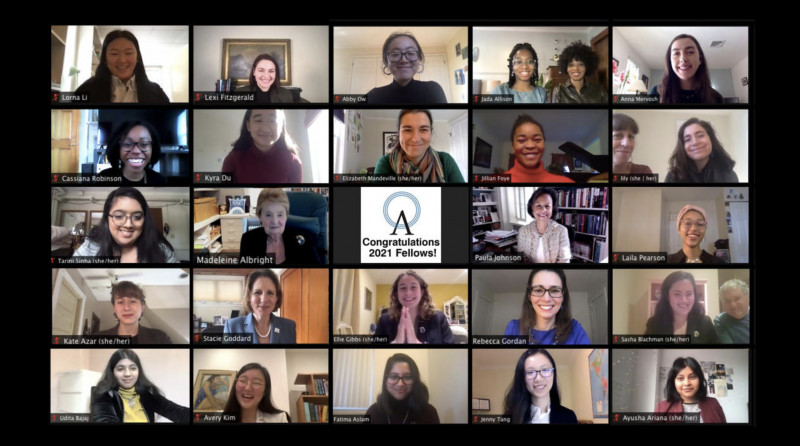Every year during Wellesley’s Wintersession, 40 juniors and seniors are selected to be part of the Albright Institute for Global Affairs. A program envisioned by former Secretary of State Madeleine Albright ’59, this fellowship aims to mold its fellows into global leaders, challenging them to take on some of the most pressing issues in today’s world.
This year’s Albright Institute was virtual in light of the ongoing pandemic, a shift that came as a disappointment to many of its participants. However, their excitement about being part of the program overshadowed these feelings. 2022 Fellow Karolina Oleszczuk ’22 was intrigued by the relationships the fellows and mentors would build with one another over the course of the three weeks.
“It is an extremely valuable network that’s much tighter than the Wellesley network in itself,” Oleszczuk explained.
The Institute places its fellows into small groups matched with each other based on a profile of their strengths and weaknesses. From there, each group is given a topical issue with which they are unlikely to have any prior connection; they have to research and analyze extensively in order to find solutions. The session culminates in multiple presentations and Q&A sessions delivered in front of prominent leaders in global affairs, including Albright herself.
The idea of letting people with different experiences and skill sets collaborate is appreciated by the fellows.
“You have students come together from different disciplines and majors, working on a topic that most people know nothing about,” Fellow Asma Mardini ’22 said.
According to fellows, the range of issues encompassed in each Wintersession is truly astounding. Oleszczuk’s group researched the implications of the FSO Safer, an oil tanker that is moored in the Red Sea, approximately five miles off the Yemeni coast. Because of the sheer volume of oil stored in the stuck ship, a single spark could bring on one of the world’s deadliest humanitarian and ecological crises.
The group met with several experts on the topic, collecting a range of scenarios that could arise from every possible action. Their challenge was to determine what the best possible paths might be. Mardini added that effective leaders often cross between the foundations of public and private sectors, playing diplomatic cards differently in order to achieve specific goals.
Though the 9 a.m. to 5 p.m. EST schedule demands of the fellowship resulted in Zoom fatigue, groups went above and beyond when it came to team bonding, catching up on each other’s lives and getting to know one another. In the return back to campus, they’ve made efforts to hang out together and maintain those bonds. After all, the real magic behind the Institute stemmed from the fellows, each of whom brought a range of diverse and meaningful experiences with them. “You have so much to learn from people who take a different approach than you,” Mardini said.






